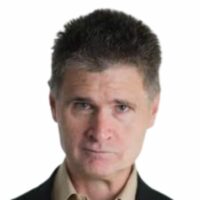The Seven Network giving airtime to far-right extremists makes the job of security agencies more difficult, at a time of a growing threat from neo-Nazi groups, writes Bernard Keane.
The Seven Network’s extraordinary attempt to mainstream Nazi views by giving an uncritical platform to convicted criminal Blair Cottrell, leader of the far-right group United Patriots Front, has prompted concerns about the undermining of national security as intelligence agencies deal with the growing threat of neo-Nazi violence.
Seven’s “news” report on Sunday, in which Cottrell was allowed to freely opine about the alleged “African gangs” issue in Melbourne as a legitimate Neighbourhood Watch-style community group, prompted widespread condemnation and social media derision, with the hashtag #7summerofnazis trending heavily. (See Tweets below, streaming live so jump in and add your own!)
Cottrell, who also professes a range of misogynist and homophobic views, has been jailed for several violent offences including assault, damaging property and stalking, idolises Hitler and has proposed “execute the leftists” as a way to control media coverage. A member of UPF was separately charged in 2016 with preparing for a terrorist attack against left-wing groups.
Seven has a history of giving a platform to extremists: it gave Pauline Hanson extensive airtime on its morning breakfast program to advertise her brand of bigotry leading up to the 2016 election, at which her party won four seats.
Sunrise was paying Pauline Hanson in the lead up to the 2016 election and giving her a leg-up into the bargain. Lending legitimacy to extremist views to bump up ratings ignores dangerous consequences. https://t.co/SiZCqj1y0t via @newscomauHQ
— ?Sandi Keane (@Jarrapin) January 16, 2018
Its platform for Cottrell comes at a time of growing concern within Australia’s security agencies. Last year, the head of the Australian Security Intelligence Organisation, Duncan Lewis, warned about right-wing extremist violence, saying
“to the extent that there is a possibility of violence, or there is indeed violence being offered, that is of interest to us. That is business for ASIO. It is a real problem and it is something that we’re very, very acutely aware of and I have people working that particular issue.”
Lewis’ remarks were directed at another neo-Nazi group, Reclaim Australia. But it is understood that UPF is on the radar police and intelligence agencies.
Victorian Labor MP Anthony Byrne savaged Seven for giving airtime to Cottrell and his band. Byrne, who is deputy chair of parliament’s intelligence and security committee, tweeted
“I cannot believe what I’ve just watched. UPF is well known to authorities for all the wrong reasons yet you ask them for comment. What on earth do you think your doing channel 7, promoting criminals and right-wing hate groups who btw greatly concern our security services.”
I cannot believe what I’ve just watched. UPF is well known to authorities for all the wrong reasons yet you ask them for comment. What on earth do you think your doing channel 7, promoting criminals and right wing hate groups who btw greatly concern our security services. https://t.co/SaYILmulip
— Anthony Byrne (@AnthonyByrne_MP) January 15, 2018
Byrne’s electorate was where the Endeavour Hills attack occurred in 2014. Cottrell and his gang embarrassed themselves when they delivered a Christmas tree to a nearby Dandenong mosque in 2015 and their efforts to intimidate and humiliate were met with civility and good grace. Byrne told Crikey he loathes groups like UPF.
“These are the losers who failed to get into the army, failed to get into the police force, so they bulk up and get into neo-Nazi ideology, misogyny, homophobia, anti-Semitism.”
Byrne’s fear is that the actions of Seven lend legitimacy to extremist views, creating a more accepting environment both for both groups disposed to violence and those who exacerbate community tensions, reducing the capacity of security agencies to gain the cooperation of communities to identify extremists.
The price of mainstreaming Nazism and giving a platform to extremist criminals for ratings may yet be paid in a more dangerous currency.
See live Twitterstream below. Scroll down for more Tweets. Don’t forget to add your own!

Bernard Keane
Bernard Keane is Crikey’s political editor. Before that he was Crikey’s Canberra press gallery correspondent, covering politics, national security and economics.
You can follow Bernard on Twitter @BernardKeane. This article was republished with permission. You can view the original here.
Ian Narev should go: CBA can’t spin its way out of money laundering crisis
Bernard Keane is Crikey’s political editor. Before that he was Crikey’s Canberra press gallery correspondent, covering politics, national security and economics.
